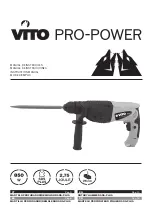
EN
5
Ferm
connected to the terminal which is marked
with the letter N or coloured black.
•
The wire which is coloured brown must be
connected to the terminal which is marked
with the letter L or coloured red.
Technical data
Mains voltage
220-240V~
Mains frequency
50Hz
Power input
1,500W
No-load speed
350 - 800 /min
Impact rate
1100 - 2700 /min
Max. drilling diameter
Wood
40 mm
Steel
13 mm
Concrete
36 mm
Weight
6 kg
Noise and vibration
Hammer position
Sound pressure (Lpa)
98.5 dB(A)
Acoustic power (Lwa)
109.5 dB(A)
Uncertainty (K)
3 dB(A)
Vibration main handle
19.819 m/s
2
Uncertainty (K)
1.5 m/s
2
Hammer/drill position
Sound pressure (Lpa)
96.88 dB(A)
Acoustic power (Lwa)
107.88 dB(A)
Uncertainty (K)
3 dB(A)
Vibration main handle
24.847 m/s
2
Uncertainty (K)
1.5 m/s
2
Wear hearing protection.
Vibration level
The vibration emission level stated in this
instruction manual has been measured in
accordance with a standardised test given in EN
60745; it may be used to compare one tool with
another and as a preliminary assessment of
exposure to vibration when using the tool for the
applications mentioned
•
using the tool for different applications, or with
different or poorly maintainted accessories,
may significantly increase the exposure level
•
the times when the tool is switched off or when
it is running but not actually doing the job, may
signifi cantly reduce the exposure level
Protect yourself against the effects of vibration by
maintaining the tool and its accessories, keeping
your hands warm, and organizing your work
patterns
Description
(fig. A)
Your hammer drill has been designed for drilling
holes into wood, steel, and masonry. The machine
can also be used as a demolition hammer in
combination with the SDS chisels.
1. On/off switch
2. Drill selection switch
3. Hammer selection lever
4. Chuck
5. Locking sleeve
6. Main grip
7. Auxiliary grip
8. Depth stop
9. Lubrication point
10. Carbon brush holder
11. Adjusting wheel for electronic speed control
Assembly
Before assembly, always switch off the
machine and remove the mains plug from
the mains.
Mounting and removing the accessory
(fig. B)
Do not use blunt drill bits or chisels.
Immediately sharpen or replace blunt drill
bits or chisels.
Mounting
•
Apply a few drops of oil to the shaft of the
accessory.
•
Slide the locking sleeve (5) to the rear.
•
Insert the accessory into the chuck (4).
•
Secure the accessory by turning it
counterclockwise until it locks into place.
•
Release the locking sleeve (5).
Removing
•
Slide the locking sleeve (5) to the rear.
•
Remove the accessory from the chuck (4).
•
Release the locking sleeve (5).
Mounting and removing the auxiliary grip
(fig. C)
Mounting
•
Loosen the auxiliary grip (7) by turning it
counterclockwise.
•
Mount the auxiliary grip (7) by sliding it over
Summary of Contents for FBH-1500
Page 2: ...2 Ferm 2 9 3 1 6 11 10 5 4 7 8 Fig A 4 5 Fig B...
Page 3: ...3 Ferm 8 7 4 15 4 A B C 2 2 2 3 3 3 Fig D Fig E Fig C...
Page 86: ...RU 86 Ferm Ferm Ferm...
Page 89: ...RU 89 Ferm 9 9 9 9 9 A 10 10 15 2002 96...
Page 90: ...UK 90 Ferm Ferm Ferm 1 5 2...
Page 93: ...UK 93 Ferm 9 9 9 9 9 10 10 15 2002 96 EC...
Page 94: ...EL 94 Ferm Ferm Ferm 1 5 mm2...
Page 97: ...EL 97 Ferm A 9 9 9 9 9 10 10 15 2002 96 E...
Page 98: ...BG 98 Ferm Ferm Ferm 1 5 2...
Page 100: ...BG 100 Ferm C 7 7 4 7 7 7 7 7 C 7 8 7 8 7 7 8 7 D 4 15 15 4 15 4 15 A 1 1 A E E B C 2 3 1 2...
Page 101: ...BG 101 Ferm 3 4 5 6 Max A 9 9 9 9 9 A 10 10 15 2002 96 E x...
Page 102: ...102 Ferm...
Page 103: ...103 Ferm...
Page 104: ...104 Ferm...
Page 105: ...105 Ferm Exploded view...
Page 108: ...WWW FERM COM 1201 05...




































